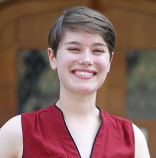In the spring of 2020, 36 PhD students from a range of academic disciplines at Penn participated in Career Services’ PhD Career Exploration Fellowship (CEF) program, where they were matched with a host organization in Philadelphia to learn about different careers beyond academia. Megan Genovese, a PhD candidate in Communication, was placed as a Fellow with the Library and Archives department at the Philadelphia Museum of Art. Read about her experience in the CEF below!
 What was your fellowship experience like working with your host? What activities did you engage in?
What was your fellowship experience like working with your host? What activities did you engage in?
The original plan was for me to shadow my host during a day of team meetings both within her department and collaboration with other departments. After the museum closed, we instead had several meetings via video conference. We discussed her career path, avenues for transitioning out of academia, her current duties, and different institutions and roles in the museum and library sphere. She also connected me with several colleagues at PMA and PALCI to learn more about career opportunities in grant writing and library consortia.
What did you learn from this opportunity (about yourself, about career fields, the job search, etc.)?
CEF really helped my gain confidence in the opportunities I can pursue outside of academia. In particular, I was concerned that I would have to go back for an MLS to move into the careers I’m interested in, but I was able to meet multiple professionals who moved from academia into those careers without it. That and the CEF sessions helped me to start thinking about my academic career in terms of transferrable skillsets rather than a direct path into teaching and research jobs that aren’t the right fit for me.
How does your CEF experience benefit your future career plans?
My host and her colleagues pointed me to sites where I can find new job listings in the museum and library sphere. This experience also broadened my understanding of which institutions foster careers I’m interested in, particularly in the government and non-profit sectors.
What was the most valuable part of your CEF experience?
The most valuable part of my CEF experience was learning to shift how I read job listings, not to focus on checking the box of every requirement but to try to match what the role calls for with what I could bring to it.
Top reason PhD students should apply to the CEF?
We all know what the academic job market and hiring process look like from the inside, but trying to figure out non-academic career paths is daunting, especially for humanities people. CEF is a great way to explore those options and start learning how to leverage your graduate experiences to move into those spaces.
For more information about Career Services’ PhD Career Exploration Fellowship, please visit our program webpage here.




